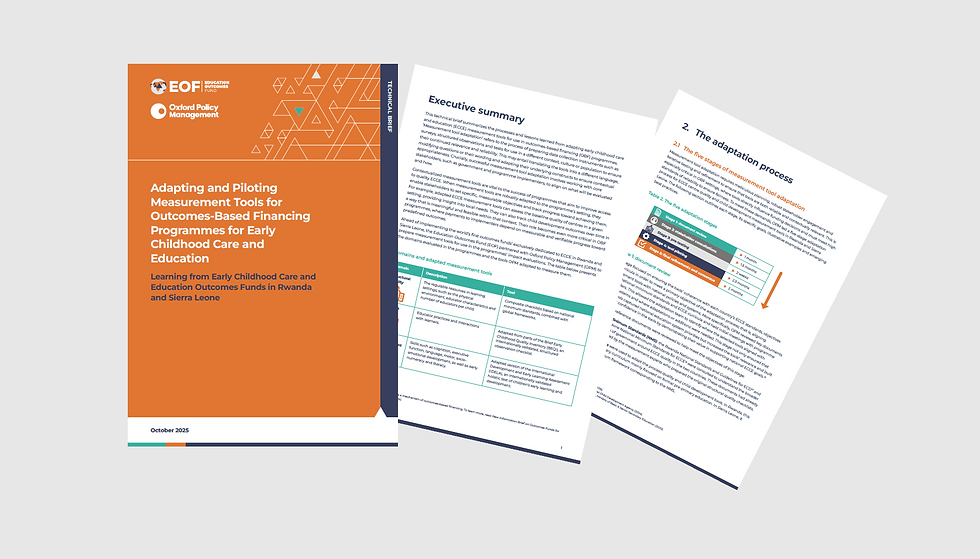Adapting Measurement Tools for OBF Programmes for ECCE
- Nov 4, 2025
- 2 min read
Updated: Nov 13, 2025
Selecting the most appropriate measurement tools for an outcomes-based financing (OBF) programme in early childhood care and education (ECCE) is a crucial first step in ensuring that measurement is both valid and meaningful. However, the process does not end with tool selection. Equally important is the careful adaptation of these tools to the specific context in which they will be applied, taking into account stakeholder priorities, national ECCE policies, and implementation conditions.
This new technical brief, Adapting and Piloting Measurement Tools for OBF Programmes for ECCE, shares detailed insights from the process of adapting ECCE quality and child development measurement tools for use in the world’s first outcomes funds dedicated exclusively to ECCE in Rwanda and Sierra Leone. Developed in partnership between the Education Outcomes Fund and Oxford Policy Management, the brief provides actionable guidance for those preparing to adapt measurement tools for impact evaluations in OBF programmes.
Technical Brief: Adapting and Piloting Measurement Tools for OBF Programmes for ECCE

Download the full technical brief here:
About the Brief
The brief outlines a five-stage process used to adapt tools measuring 1) structural quality, 2) process quality, and 3) child development in ECCE.
During the design process for ECCE outcomes funds in Rwanda and Sierra Leone, the participatory and iterative approach helped the team meet the following objectives:
The five adaptation stages:

Align tools with national policies and systems
Maintain the psychometric robustness of globally validated instruments
Ensure tools are practical and usable in real programme settings
Meet the transparency demands of OBF programmes
Key Learnings for Adapting Measurement Tools
Involve the tools’ creators to understand original intent and adaptation possibilities
Engage diverse stakeholders with government leadership at the centre
Conduct pre-testing before piloting to identify usability and contextual issues early in the process
Treat pilots as real fieldwork - pilot data is critical for confirming validity and reliability
Build consensus among implementers, government, and funders to reinforce trust
Our Commitment to Continuous Learning
Reliable outcome measurement depends on strong technical processes, yet these are rarely shared openly. This brief reflects EOF’s commitment to transparency, offering insights from a core process that underpins effective measurement.
In the OBF context, such clarity and participation are essential to build confidence, trust, and shared ownership, ensuring measurement is both rigorous and collaborative. By sharing our learnings, EOF aims to advance global dialogue on how participatory, transparent measurement can enhance quality assurance and improve ECCE and OBF programme delivery worldwide.
At EOF we're exploring using AI to create audio versions of our publications.
Try out this tool and let us know what you’re using – we’re always looking for
ideas on increasing accessibility.






Comments